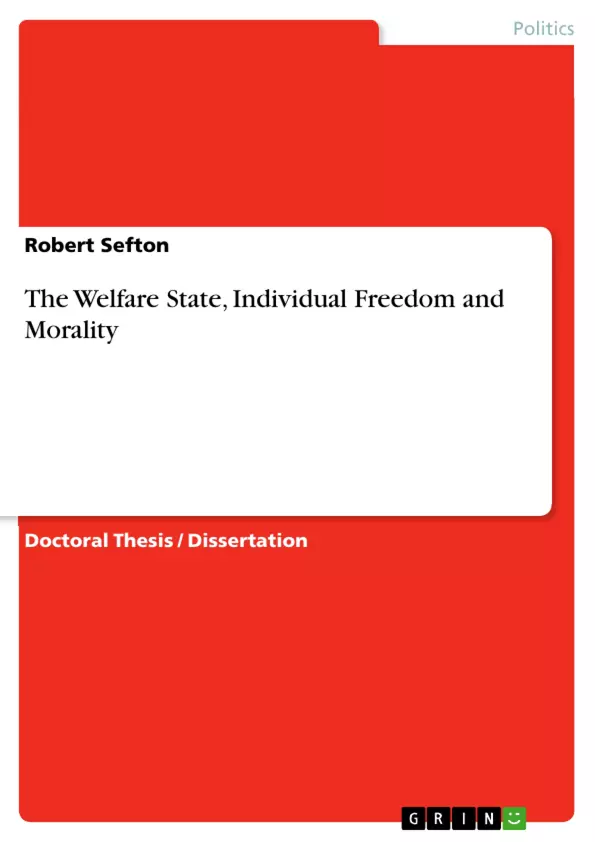Every since the creation of welfare states in the US and Western Europe there has been enumerable debates as to what extent the existence of such welfare states undermines individual freedom. These debates raise such questions as how should we define freedom? To what extent is freedom compatible with attempts made by the state to promote the welfare of its citizens? Does liberty reside in independence from state interference? Does the provision of welfare impose constraints on individual liberty? However this text goes further and questions whether morality should be taken into account when deciding who should receive state welfare? And whether state interference goes against human nature?
Inhaltsverzeichnis (Table of Contents)
- Introduction
- Chapter 1.0 Theoretical Underpinnings of the welfare state
- Chapter 1.1 How do we define Freedom?
- Chapter 1.2 Liberalism, the Individual and the state
- Chapter 1.3 From Poor Laws to Welfare State
- Chapter 2.0 Welfare Dependency: Encouraging Idleness
- Chapter 2.1 The Underclass
- Chapter 2.2 'NHS Dependency'
- Chapter 2.3 The NHS as a 'Sacred Cow'
- Chapter 3.0 The Welfare State, Morality and Human Nature
- Chapter 3.1 The Welfare State and Morality
- Chapter 3.2 The Welfare State and Human Nature
- Chapter 3.3 The Welfare State and the Church
Zielsetzung und Themenschwerpunkte (Objectives and Key Themes)
This dissertation analyzes the relationship between the welfare state and individual freedom, exploring the extent to which welfare provisions erode individual liberty. The primary objective is to evaluate the arguments surrounding this complex issue. Key themes explored in the work include:- Defining freedom and its relation to state intervention.
- The concept of welfare dependency and its potential to restrict individual liberty.
- The impact of the welfare state on morality and human nature.
- The role of the welfare state in promoting social justice or social exclusion.
- The expansion of the welfare state and its consequences for individual freedom.
Zusammenfassung der Kapitel (Chapter Summaries)
Chapter 1 examines the theoretical underpinnings of freedom, considering the definition of freedom and its compatibility with state efforts to promote welfare. The chapter also explores the evolution of welfare provision from traditional poor laws to the modern welfare state. Chapter 2 focuses on the issue of welfare dependency, exploring arguments regarding the potential for welfare to encourage idleness and create an underclass. This chapter examines the "ratchet effect," where the welfare state expands to address an increasing range of social problems. Chapter 3 analyzes the relationship between the welfare state, morality, and human nature. The chapter explores whether moral considerations should influence the allocation of welfare and considers the extent to which state intervention might contradict human nature.Schlüsselwörter (Keywords)
The central concepts in this dissertation include individual freedom, welfare state, welfare dependency, social justice, social exclusion, moral implications, human nature, and the "ratchet effect" of welfare expansion. These themes are explored through the lens of political philosophy and the historical development of the welfare state in the Western world.Frequently Asked Questions
Does the welfare state undermine individual freedom?
The dissertation explores this debate, examining whether state provision of welfare imposes constraints on liberty or if freedom is compatible with state efforts to promote citizen welfare.
What is "welfare dependency"?
Welfare dependency refers to the argument that state support might encourage idleness and create an "underclass" that relies long-term on state aid rather than personal independence.
Should morality be considered in welfare allocation?
The text questions whether moral judgments should play a role in deciding who receives welfare and analyzes how the welfare state impacts the general morality of society.
What is the "ratchet effect" of welfare expansion?
The ratchet effect describes how the welfare state tends to expand continuously to address new social problems, making it difficult to reduce its scope once established.
Is state interference against human nature?
The dissertation analyzes the relationship between state intervention and human nature, exploring whether providing for all needs contradicts the natural drive for self-reliance and competition.
- Quote paper
- Robert Sefton (Author), 2012, The Welfare State, Individual Freedom and Morality, Munich, GRIN Verlag, https://www.grin.com/document/195284



